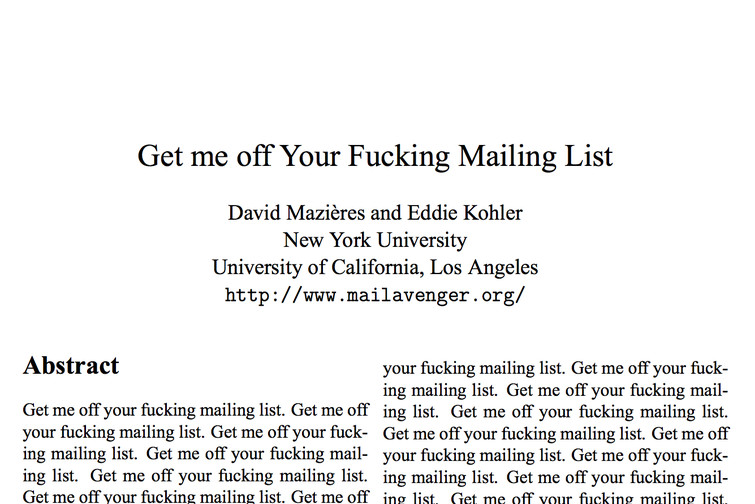The International Journal of Advanced Computer Technology accepted a paper by computer scientists David Mazières and Eddie Kohler titled "Get Me Off Your Fucking Mailing List".
In 2005 they created this highly profane ten-page paper as a joke, to send in replying to unwanted conference invitations. It literally just contains that seven-word phrase over and over, along with a nice flow chart and scatter-plot graph:
An Australian computer scientist named Peter Vamplew sent it to the International Journal of Advanced Computer Technology in response to spam from the journal. Apparently, he thought the editors might simply open and read it. [Source.]
Instead, the journal automatically accepted the paper — with an anonymous reviewer rating it as "excellent" — and requested a fee of $150.
There are hundreds, perhaps thousands, of journals like this online these days. They publish anything for a fee. They do not review, they don't even open the papers submitted. Jeffrey Beall, a librarian at the University of Colorado, keeps an up-to-date list of them to help researchers avoid being taken in; it currently has 550 publishers and journals on it.
But the International Journal of Advanced Computer Technology is not the most dangerous of its kind. It can easily be dismissed as bogus. The danger lies in semi-serious journals that pretend to be more scholarly and which are taken seriously by university departments. The list of them is endless. Everybody is trying to publish, whatever, whenever, and wherever, and the result is the creation of these crappy journals.
Why do these journals survive? Because, clearly, someone, some people take them seriously. Alas, these people are not closer than we may think.
In 2005 they created this highly profane ten-page paper as a joke, to send in replying to unwanted conference invitations. It literally just contains that seven-word phrase over and over, along with a nice flow chart and scatter-plot graph:
An Australian computer scientist named Peter Vamplew sent it to the International Journal of Advanced Computer Technology in response to spam from the journal. Apparently, he thought the editors might simply open and read it. [Source.]
Instead, the journal automatically accepted the paper — with an anonymous reviewer rating it as "excellent" — and requested a fee of $150.
There are hundreds, perhaps thousands, of journals like this online these days. They publish anything for a fee. They do not review, they don't even open the papers submitted. Jeffrey Beall, a librarian at the University of Colorado, keeps an up-to-date list of them to help researchers avoid being taken in; it currently has 550 publishers and journals on it.
But the International Journal of Advanced Computer Technology is not the most dangerous of its kind. It can easily be dismissed as bogus. The danger lies in semi-serious journals that pretend to be more scholarly and which are taken seriously by university departments. The list of them is endless. Everybody is trying to publish, whatever, whenever, and wherever, and the result is the creation of these crappy journals.
Why do these journals survive? Because, clearly, someone, some people take them seriously. Alas, these people are not closer than we may think.





No comments:
Post a Comment